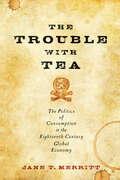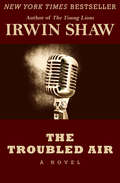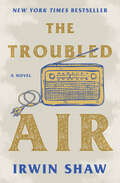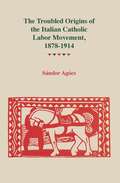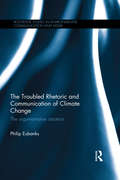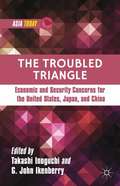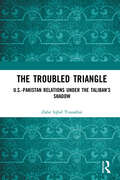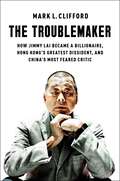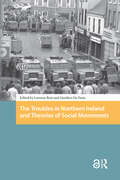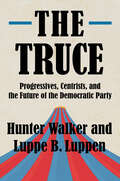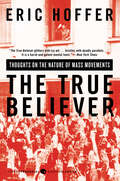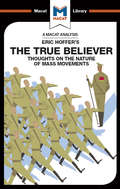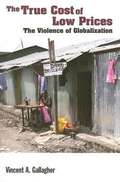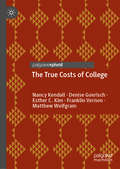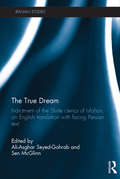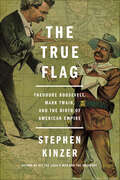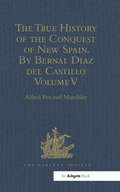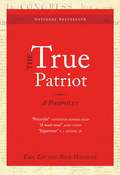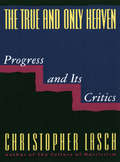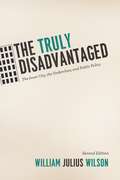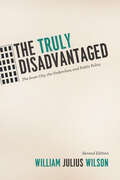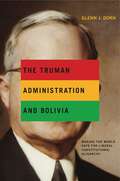- Table View
- List View
The Trouble with Tea: The Politics of Consumption in the Eighteenth-Century Global Economy (Studies in Early American Economy and Society from the Library Company of Philadelphia)
by Jane T. MerrittHow tea’s political meaning shaped the culture and economy of the Anglo-American world.Americans imagined tea as central to their revolution. After years of colonial boycotts against the commodity, the Sons of Liberty kindled the fire of independence when they dumped tea in the Boston harbor in 1773. To reject tea as a consumer item and symbol of "taxation without representation" was to reject Great Britain as master of the American economy and government. But tea played a longer and far more complicated role in American economic history than the events at Boston suggest.In The Trouble with Tea, historian Jane T. Merritt explores tea as a central component of eighteenth-century global trade and probes its connections to the politics of consumption. Arguing that tea caused trouble over the course of the eighteenth century in a number of different ways, Merritt traces the multifaceted impact of that luxury item on British imperial policy, colonial politics, and the financial structure of merchant companies. Merritt challenges the assumption among economic historians that consumer demand drove merchants to provide an ever-increasing supply of goods, thus sparking a consumer revolution in the early eighteenth century.The Trouble with Tea reveals a surprising truth: that concerns about the British political economy, coupled with the corporate machinations of the East India Company, brought an abundance of tea to Britain, causing the company to target North America as a potential market for surplus tea. American consumers only slowly habituated themselves to the beverage, aided by clever marketing and the availability of Caribbean sugar. Indeed, the "revolution" in consumer activity that followed came not from a proliferation of goods, but because the meaning of these goods changed. By the 1750s, British subjects at home and in America increasingly purchased and consumed tea on a daily basis; once thought a luxury, tea had become a necessity. This fascinating look at the unpredictable path of a single commodity will change the way readers look at both tea and the emergence of America.
The Trouble with the Congo
by Séverine AutesserreThe Trouble with the Congo suggests a new explanation for international peacebuilding failures in civil wars. Drawing from more than 330 interviews and a year and a half of field research, it develops a case study of the international intervention during the Democratic Republic of the Congo's unsuccessful transition from war to peace and democracy (2003-2006). Grassroots rivalries over land, resources, and political power motivated widespread violence. However, a dominant peacebuilding culture shaped the intervention strategy in a way that precluded action on local conflicts, ultimately dooming the international efforts to end the deadliest conflict since World War II. Most international actors interpreted continued fighting as the consequence of national and regional tensions alone. UN staff and diplomats viewed intervention at the macro levels as their only legitimate responsibility. The dominant culture constructed local peacebuilding as such an unimportant, unfamiliar, and unmanageable task that neither shocking events nor resistance from select individuals could convince international actors to reevaluate their understanding of violence and intervention.
The Troubled Air: A Novel
by Irwin ShawNew York Times Bestseller: A provocative novel about one man&’s struggle with courage and his conscience at the height of McCarthyism. Clement Archer, head of a popular radio show, faces a profound dilemma: Five of his employees stand accused of being communists, and a magazine threatens disclosure unless Archer fires each and every one. Despite his efforts to meet his own moral standards and avoid self-incrimination, Archer finds himself hounded from both ends of the political spectrum for his seemingly righteous actions. The Troubled Air, Irwin Shaw&’s second novel, was published immediately before the author moved to Europe, where he lived for the next twenty-five years. The story remains a powerful portrayal of a good, decent man ensnared by the hysteria and cruelty of a dark period in American history. This ebook features an illustrated biography of Irwin Shaw including rare images and never-before-seen documents from the author&’s estate.
The Troubled Air: A Novel
by Irwin ShawNew York Times Bestseller: A provocative novel about one man&’s struggle with courage and his conscience at the height of McCarthyism. Clement Archer, head of a popular radio show, faces a profound dilemma: Five of his employees stand accused of being communists, and a magazine threatens disclosure unless Archer fires each and every one. Despite his efforts to meet his own moral standards and avoid self-incrimination, Archer finds himself hounded from both ends of the political spectrum for his seemingly righteous actions. The Troubled Air, Irwin Shaw&’s second novel, was published immediately before the author moved to Europe, where he lived for the next twenty-five years. The story remains a powerful portrayal of a good, decent man ensnared by the hysteria and cruelty of a dark period in American history. This ebook features an illustrated biography of Irwin Shaw including rare images and never-before-seen documents from the author&’s estate.
The Troubled Origins of the Italian Catholic Labor Movement, 1878–1914
by Sándor AgócsIn his book, Sándor Agócs explores the conflicts that accompanied the emergence of the Italian Catholic labor movement. He examines the ideologies that were at work and details the organizational forms they inspired. During the formative years of the Italian labor movement, Neo-Thomism became the official ideology of the church. Church leadership drew upon the central Thomistic principal of caritas, Christian love, in its response to the social climate in Italy, which had become increasingly charged with class consciousness and conflict. Aquinas’s principles ruled out class struggle as contrary to the spirit of Christianity and called for a symbiotic relationship among the various social strata. Neo-Thomistic philosophy also emphasized the social functions of property, a principle that demanded the paternalistic care and tutelage of the interests of working people by the wealthy. In applying these principles to the nascent labor movement, the church's leadership called for a mixed union (misto), whose membership would include both capitalists and workers. They argued that this type of union best reflected the tenets of Neo-Thomistic social philosophy. In addition, through its insistence on the misto, the church was also motivated by an obsessive concern with socialism, which it viewed as a threat, and by a fear of the working classes, which it associated with socialism, which it viewed as a threat, and by a fear of the working classes, which it associated with socialism. In pressing for the mixed union, therefore, the church leadership hoped not only to realize Neo-Thomistic principles, but also to defuse class struggle and prevent the proletariat from becoming a viable social and political force. Catholic activists, who were called upon to put ideas into practice and confronted social realities daily, learned that the "mixed" unions were a utopian vision that could not be realized. They knew that the age of paternalism was over and that neither the workers not the capitalists were interested in the mixed union. In its stead, the activists urged for the "simple" union, an organization for workers only. The conflict which ensued pitted the bourgeoisie and the Catholic hierarchy against the young activists. Sándor Agócs reveals precisely in what way Catholic social thought was inadequate to deal with the realities of unionization and why Catholics were unable to present a reasonable alternative.
The Troubled Rhetoric and Communication of Climate Change: The argumentative situation (Routledge Studies in Environmental Communication and Media)
by Philip EubanksDespite an overwhelming scientific consensus, climate change remains one of the most controversial issues of our time. Focusing on the rhetoric that surrounds the issue of climate change, this groundbreaking book analyses why the debate continues to rage and examines how we should argue when winning the argument really matters. Going beyond routine condemnations of the wildest statements made by religious fundamentalists or spokespeople for fossil fuel interests, the book explains the mutually exacerbating problems that permit many of us greet catastrophic predictions with an equivocal shrug. It argues that the argumentative situation around climate change makes a certain kind of skepticism – "fair-minded skepticism" – not only possible but likely. The book also strikes a hopeful note, reminding us that people do change their minds in response to effective argumentation that appeals to deeply shared values. Offering new insight into an ongoing academic discussion about the nature of argument and how it can be undertaken more effectively and ethically, as well as a new perspective on the rhetoric of science and technology, this book will be a valuable resource to students and scholars of climate change, environmental humanities, rhetoric, environmental communication, sociology and science and technology studies.
The Troubled Triangle
by G. John Ikenberry Takashi InoguchiThe US, China, and Japan form a 'troubled triangle,' with each country negotiating its foreign policy toward the other two in response to economic and security pressures that operate as an interrelated duality. Written by international relations experts, this book examines how the three countries respond to this set of pressures and to each other.
The Troubled Triangle: US-Pakistan Relations under the Taliban’s Shadow
by Zafar Iqbal YousafzaiThis book is a comprehensive analysis of the Taliban, and how it has affected post-9/11 U.S.-Pakistan relations. It analyzes the genesis of the Taliban, the rationale behind their emergence and how they consolidated their rule in Afghanistan from 1996 to 2001. It examines the U.S. policies towards the Taliban in the post 9/11 era and Pakistan’s role as an ally in their efforts towards dismantling Taliban rule in Afghanistan—from Obama’s ‘fight and talk’ policy to the Doha peace agreement in 2020. It also discusses the outcomes of the Global War on Terror (GWoT), as well as the Taliban’s response to the U.S.-led ISAF and NATO forces in Afghanistan. The volume brings into focus Pakistan’s policies vis-à-vis the Taliban following the start of GWoT and how it pushed the U.S.-Pakistan relations to its lowest ebb; and then its role in bringing the Taliban to the negotiating table which resulted in the U.S.-Taliban deal in Doha in February 2020. The author introduces a ‘new balance of threat’ theory and expands on its applicability through the Taliban case study. The book will be of great interest to scholars and researchers of U.S. foreign policy, international relations, peace and conflict studies, strategic studies, history, diplomatic studies and South Asian politics.
The Troublemaker: How Jimmy Lai Became a Billionaire, Hong Kong's Greatest Dissident, and China's Most Feared Critic
by Mark L. CliffordThe astonishing story of the billionaire businessman Jimmy Lai who became one of Hong Kong&’s leading activists for democracy and is today China&’s most famous political prisoner.Jimmy Lai escaped mainland China when he was twelve years old, at the height of a famine that killed tens of millions. In Hong Kong, he hustled; no work was beneath him, and he often slept on a table in a clothing factory where he did odd jobs. At twenty-one, he was running a factory. By his mid-twenties, he owned one and was supplying sweaters and shirts to some of the biggest brands in the United States, from Polo to The Limited. His ideas about retail led him to create Giordano in 1981, and with it &“fast fashion.&” A restless entrepreneur, as Giordano prepared to go public, he was thinking about a dining concept that would disrupt Hong Kong&’s fast-food industry. But then came the Tiananmen Square democracy protest and the massacre of 1989. His reaction to the violence was to enter the media business to push China toward more freedoms. He started a magazine, Next, to advocate for democracy in Hong Kong. Then, just two years before the city was to return to Chinese control, he founded the Apple Daily newspaper. Its mix of bold graphics, gossip, local news, and opposition to the Chinese Communist Party was an immediate hit. For more than two decades, Lai used Apple and Next as part of a personal push for democracy—in weekly columns, at rallies and marches, and, memorably, sitting in front of a tent during the 2014 Occupy Central movement. Lai took his activism abroad, traveling frequently to Washington, where he was well known in Congress and in political circles. China reacted with fury in 2019 when he met with Vice President Mike Pence and Secretary of State Mike Pompeo. A draconian new security law came into effect in Hong Kong in mid-2020, effectively making free speech a crime and censorship a fact. Lai was its most important target. Apple Daily was raided on August 10, 2020. He was arrested and held without bail before being convicted of trumped-up charges ranging from lighting a candle (&“incitement to riot&”) to violating a clause in his company&’s lease (&“fraud&”). At the end of 2023, a lengthy trial began alleging &“collusion with foreign forces&” and printing seditious materials. China&’s most famous political prisoner has been in jail for more than 1,100 days and could spend the rest of his life there. The Troublemaker is his story.
The Troubles in Northern Ireland and Theories of Social Movements (Protest and Social Movements)
by Lorenzo Bosi; Gianluca De FazioThis volume focuses on a number of research questions, drawn from social movement scholarship: How does nonviolent mobilisation emerge and persist in deeply divided societies? What are the trajectories of participation in violent groups in these societies? What is the relationship between overt mobilisation, clandestine operations and protests among political prisoners? What is the role of media coverage and identity politics? Can there be non-sectarian collective mobilisation in deeply divided societies? The answers to these questions do not merely try to explain contentious politics in Northern Ireland; instead, they inform future research on social movements beyond this case. Specifically, we argue that an actor-based approach and the contextualisation of contentious politics provide a dynamic theoretical framework to better understand the Troubles and the development of conflicts in deeply divided societies.
The Truce: Progressives, Centrists, and the Future of the Democratic Party
by Hunter Walker Luppe B. LuppenAn inside story of the Democratic Party at a moment of great peril. Even before the cataclysmic 2016 election, the Democratic Party had long been at war with itself—yet Joe Biden’s narrow victory in 2020 bridged the divide. Facing the dire threat of a second Trump administration, Democrats forged an unlikely but effective coalition that stalled Trumpism at the ballot box and enacted a raft of consequential legislation. But how long can the uneasy peace hold, and can Biden win again? The Truce is a definitive history of a half-decade of upheaval in the Democratic Party in which a new generation aggressively pursued their progressive ideals while the powerful, centrist establishment adapted to remain in command. Journalists Hunter Walker and Luppe B. Luppen illuminate this story of backroom maneuvering and political strategy with new revelations about pivotal events and exclusive, on-the-record comments from activists, campaign operatives, and members of Congress. The Truce explores the major fault lines that define Democratic politics today and asks big questions about the future of the party. Will economic or social justice hold primacy at the top of the Democratic agenda? Who will lead the major wings of the party after two defining figures, Biden and Sanders, exit the stage? The Truce surveys the major shifts underway, from the rise of the Squad and new Democratic leadership in the House to a complete overhaul of the primary process. By digging into the divide between left and center, Walker and Luppen expose the creeping generational and political tensions that Biden has—for the moment—kept at bay. An engrossing work, and a surprising page-turner, The Truce grapples with the dangers that threaten American democracy and the complicated cast of characters who are trying to save it.
The True Believer: Thoughts on the Nature of Mass Movements
by Eric HofferA stevedore on the San Francisco docks in the 1940s, Eric Hoffer wrote philosophical treatises in his spare time while living in the railroad yards. The True Believer -- the first and most famous of his books -- was made into a bestseller when President Eisenhower cited it during one of the earliest television press conferences.Completely relevant and essential for understanding the world today, The True Believer is a visionary, highly provocative look into the mind of the fanatic and a penetrating study of how an individual becomes one.
The True Believer: Thoughts on the Nature of Mass Movements
by Jonah S. RubinEric Hoffer’s The True Believer: Thoughts on the Nature of Mass Movements is one of the most widely read works of social psychology written in the 20th-century. It exemplifies the powers of creative thinking and critical analysis at their best, providing an insight into two crucial elements of critical thinking. Hoffer is likely to go down in history as one of America’s great creative thinkers – a writer not bound by standard frameworks of thinking or academic conventions, willing to beat his own path in framing the best possible answers to the questions he investigated. An impoverished, largely unschooled manual laborer who had survived the worst effects of the Great Depression in the United States, Hoffer was a passionate autodidact whose philosophical and psychological education came from omnivorous reading. Working without the help of any mentors, he forged the fearsomely creative and individual approach to problems demonstrated in The True Believer. The book, which earned him his reputation, examines the different phenomena of fanaticism – religious or political – and applies Hoffer’s analytical skills to reveal that, deep down, all ‘true believers’ display the same needs and tendencies, whatever their final choice of belief. Incisive and persuasive, it remains a classic.
The True Cost of Low Prices
by Vincent A. GallagherGallagher (a lecturer on globalization at the Romero Center, a Catholic "Retreat and Social Justice Center" in East Camden, New Jersey) offers a primer on the institutional violence wrought by neoliberal globalization around the world. He explains the operations of the political, economic, legal, and military institutions that together make up the neoliberal global order, later describing their effects on the world's poor and the most vulnerable including children forced to work in sweatshop conditions and worse and women trafficked as sexual slaves. Finally, he presents solutions rooted in Catholic liberation theology. Annotation ©2007 Book News, Inc., Portland, OR (booknews.com)
The True Costs of College
by Nancy Kendall Denise Goerisch Esther C. Kim Franklin Vernon Matthew WolfgramThis book examines the true costs of attendance faced by low- and moderate-income students on four public college campuses, and the consequences of these costs on students’ academic pathways and their social, financial, health, and emotional well-being. The authors’ exploration of the true costs of academics, living expenses, and student services leads them to conclude that current college policies and practices do not support low-income and otherwise marginalized students’ well-being or success. To counter this, they suggest that reform efforts should begin by asking value-based questions about the goals of public higher education, and end by crafting class-responsive policies. They propose three tools that policymakers can use to do this work, and steps that every person can take to revitalize public support for public education, equity-producing policies, and democratic participation in the public arena.
The True Dream: Indictment of the Shiite clerics of Isfahan, an English translation with facing Persian text (Iranian Studies)
by Ali-Asghar Seyed-Gohrab Sen McGlinnThe True Dream is a Persian satirical drama set in Isfahan in the lead up to Iran’s Constitutional Revolution of 1905-11. Although its three authors hail from the clerical class, they criticize the arrogance, corruption and secularity of the Iranian ruling dynasty and clergy, taking Isfahan as their example. The work blends fact and fiction by summoning the prominent men of the city to account for themselves on the Day of Judgement. God speaks offstage, delivering withering judgements of their behaviour. The dream of the authors is a vision of an Iran governed by law, where justice prevails and the clergy are honestly religious. This book has the Persian and English translation on facing pages. The introduction presents brief biographies of the authors – who wrote anonymously, but were all executed. One of the authors was the father of Mohammad-Ali Jamâlzâdeh, a pioneer of modern Persian fiction, and The True Dream was one of the first dramas, in European style, to be written in Persian. The book shows that today’s struggle for a modern society began more than a century ago, and then and now pivots on the role of the Islamic clerics (the ulama). Using colloquial language, this first English translation of a significant and humorous Persian satirical drama will prove an accessible and valuable resource for students of Persian. By marking a significant point in the influence of Western political philosophy and Western drama on the Persian intellectual classes, this book will also appeal to students and scholars of Middle Eastern History and Political Science.
The True Flag: Theodore Roosevelt, Mark Twain, And The Birth Of American Empire
by Stephen KinzerHow should the United States act in the world? Americans cannot decide. Sometimes we burn with righteous anger, launching foreign wars and deposing governments. Then we retreat—until the cycle begins again. <p><p> No matter how often we debate this question, none of what we say is original. Every argument is a pale shadow of the first and greatest debate, which erupted more than a century ago. Its themes resurface every time Americans argue whether to intervene in a foreign country. <p> Revealing a piece of forgotten history, Stephen Kinzer transports us to the dawn of the twentieth century, when the United States first found itself with the chance to dominate faraway lands. That prospect thrilled some Americans. It horrified others. Their debate gripped the nation. <p> The country’s best-known political and intellectual leaders took sides. Theodore Roosevelt, Henry Cabot Lodge, and William Randolph Hearst pushed for imperial expansion; Mark Twain, Booker T. Washington, and Andrew Carnegie preached restraint. Only once before—in the period when the United States was founded—have so many brilliant Americans so eloquently debated a question so fraught with meaning for all humanity. <p> All Americans, regardless of political perspective, can take inspiration from the titans who faced off in this epic confrontation. Their words are amazingly current. Every argument over America’s role in the world grows from this one. It all starts here.
The True Flag: Theodore Roosevelt, Mark Twain, and the Birth of American Empire
by Stephen KinzerThe bestselling author of Overthrow and The Brothers brings to life the forgotten political debate that set America’s interventionist course in the world for the twentieth century and beyond.How should the United States act in the world? Americans cannot decide. Sometimes we burn with righteous anger, launching foreign wars and deposing governments. Then we retreat—until the cycle begins again. No matter how often we debate this question, none of what we say is original. Every argument is a pale shadow of the first and greatest debate, which erupted more than a century ago. Its themes resurface every time Americans argue whether to intervene in a foreign country. Revealing a piece of forgotten history, Stephen Kinzer transports us to the dawn of the twentieth century, when the United States first found itself with the chance to dominate faraway lands. That prospect thrilled some Americans. It horrified others. Their debate gripped the nation. The country’s best-known political and intellectual leaders took sides. Theodore Roosevelt, Henry Cabot Lodge, and William Randolph Hearst pushed for imperial expansion; Mark Twain, Booker T. Washington, and Andrew Carnegie preached restraint. Only once before—in the period when the United States was founded—have so many brilliant Americans so eloquently debated a question so fraught with meaning for all humanity. All Americans, regardless of political perspective, can take inspiration from the titans who faced off in this epic confrontation. Their words are amazingly current. Every argument over America’s role in the world grows from this one. It all starts here.
The True History of the Conquest of New Spain. By Bernal Diaz del Castillo, One of its Conquerors: From the Exact Copy made of the Original Manuscript. Edited and published in Mexico by Genaro García. Volume V (Hakluyt Society, Second Ser. #30)
by Alfred Percival MaudslayContinued from Second Series 23, 24, 25, 30. Books XIV-XVII, translated into English and edited, with introduction and notes, by Alfred Percival Maudslay, M.A., Hon. Professor of Archaeology, National Museum, Mexico, relating the expedition to Honduras, the return to Mexico, the rule of the Audiencia there, and the record of the conquistadores, with an appendix including the fifth letter of Cortés to the Emperor Charles V, 1526. This is a new print-on-demand hardback edition of the volume first published in 1916. Owing to technical constraints the Map of Tabasco, by Melchor Alfaro de Santa Cruz, 1579 is not included.
The True Patriot
by Eric Liu Nick HanauerOver the course of a generation, patriotism in America has been hijacked by the right and abandoned by the left. But the principles and values of true patriotism - country above self, contribution above consumption, stewardship over exploitation, freedom with responsibility, purpose through sacrifice and service, pragmatism, a fair shot for all - are inherently progressive. The True Patriot, written in the pamphleteering style of Thomas Paine (Common Sense), challenges progressives to reclaim patriotism - and spells out just how to do it. This powerful and timely "little red book" combines a manifesto, a ten-principle plan, a model speech, and a moral code. Throughout, it weaves between the words of the authors and excerpts from foundational American texts and speeches, as well as a parade of iconic American images.
The True and Only Heaven: Progress and Its Critics
by Christopher Lasch"A major and challenging work. . . . Provocative, and certain to be controversial. . . . Will add important new dimension to the continuing debate on the decline of liberalism." --William Julius Wilson, New York Times Book Review Can we continue to believe in progress? In this sobering analysis of the Western human condition, Christopher Lasch seeks the answer in a history of the struggle between two ideas: one is the idea of progress - an idea driven by the conviction that human desire is insatiable and requires ever larger production forces. Opposing this materialist view is the idea that condemns a boundless appetite for more and better goods and distrusts "improvements" that only feed desire. Tracing the opposition to the idea of progress from Rousseau through Montesquieu to Carlyle, Max Weber and G.D.H. Cole, Lasch finds much that is desirable in a turn toward moral conservatism, toward a lower-middle-class culture that features egalitarianism, workmanship and loyalty, and recognizes the danger of resentment of the material goods of others.
The Truly Disadvantaged: The Inner City, the Underclass, and Public Policy
by William Julius WilsonRenowned American sociologist William Julius Wilson takes a look at the social transformation of inner city ghettos, offering a sharp evaluation of the convergence of race and poverty. Rejecting both conservative and liberal interpretations of life in the inner city, Wilson offers essential information and a number of solutions to policymakers. The Truly Disadvantaged is a wide-ranging examination, looking at the relationship between race, employment, and education from the 1950s onwards, with surprising and provocative findings. This second edition also includes a new afterword from Wilson himself that brings the book up to date and offers fresh insight into its findings. "The Truly Disadvantaged should spur critical thinking in many quarters about the causes and possible remedies for inner city poverty. As policymakers grapple with the problems of an enlarged underclass they--as well as community leaders and all concerned Americans of all races--would be advised to examine Mr. Wilson's incisive analysis. "--Robert Greenstein, New York Times Book Review
The Truly Disadvantaged: The Inner City, the Underclass, and Public Policy, Second Edition
by William Julius WilsonRenowned American sociologist William Julius Wilson takes a look at the social transformation of inner city ghettos, offering a sharp evaluation of the convergence of race and poverty. Rejecting both conservative and liberal interpretations of life in the inner city, Wilson offers essential information and a number of solutions to policymakers. The Truly Disadvantaged is a wide-ranging examination, looking at the relationship between race, employment, and education from the 1950s onwards, with surprising and provocative findings. This second edition also includes a new afterword from Wilson himself that brings the book up to date and offers fresh insight into its findings. “The Truly Disadvantaged should spur critical thinking in many quarters about the causes and possible remedies for inner city poverty. As policymakers grapple with the problems of an enlarged underclass they—as well as community leaders and all concerned Americans of all races—would be advised to examine Mr. Wilson's incisive analysis.”—Robert Greenstein, New York Times Book Review
The Truman Administration and Bolivia: Making the World Safe for Liberal Constitutional Oligarchy
by Glenn J. DornThe United States emerged from World War II with generally good relations with the countries of Latin America and with the traditional Good Neighbor policy still largely intact. But it wasn’t too long before various overarching strategic and ideological priorities began to undermine those good relations as the Cold War came to exert its grip on U.S. policy formation and implementation. In The Truman Administration and Bolivia, Glenn Dorn tells the story of how the Truman administration allowed its strategic concerns for cheap and ready access to a crucial mineral resource, tin, to take precedence over further developing a positive relationship with Bolivia. This ultimately led to the economic conflict that provided a major impetus for the resistance that culminated in the Revolution of 1952—the most important revolutionary event in Latin America since the Mexican Revolution of 1910. The emergence of another revolutionary movement in Bolivia early in the millennium under Evo Morales makes this study of its Cold War predecessor an illuminating and timely exploration of the recurrent tensions between U.S. efforts to establish and dominate a liberal capitalist world order and the counterefforts of Latin American countries like Bolivia to forge their own destinies in the shadow of the “colossus of the north.”
The Truman Administration and Bolivia: Making the World Safe for Liberal Constitutional Oligarchy
by Glenn J. DornThe United States emerged from World War II with generally good relations with the countries of Latin America and with the traditional Good Neighbor policy still largely intact. But it wasn’t too long before various overarching strategic and ideological priorities began to undermine those good relations as the Cold War came to exert its grip on U.S. policy formation and implementation. In The Truman Administration and Bolivia, Glenn Dorn tells the story of how the Truman administration allowed its strategic concerns for cheap and ready access to a crucial mineral resource, tin, to take precedence over further developing a positive relationship with Bolivia. This ultimately led to the economic conflict that provided a major impetus for the resistance that culminated in the Revolution of 1952—the most important revolutionary event in Latin America since the Mexican Revolution of 1910. The emergence of another revolutionary movement in Bolivia early in the millennium under Evo Morales makes this study of its Cold War predecessor an illuminating and timely exploration of the recurrent tensions between U.S. efforts to establish and dominate a liberal capitalist world order and the counterefforts of Latin American countries like Bolivia to forge their own destinies in the shadow of the “colossus of the north.”
